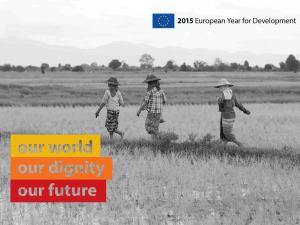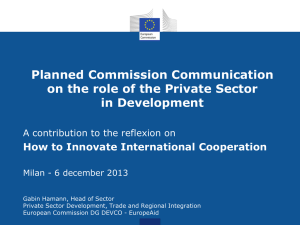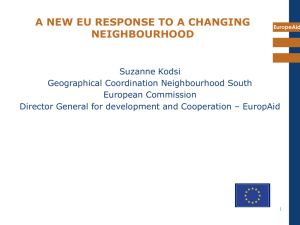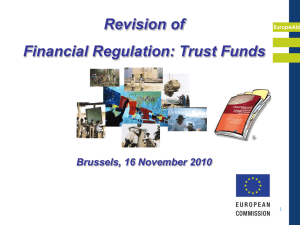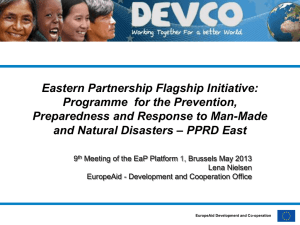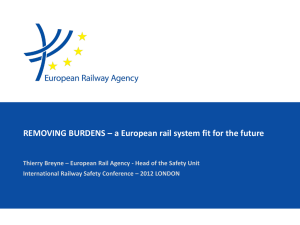NSA-NAM-SD_CISOCH
advertisement
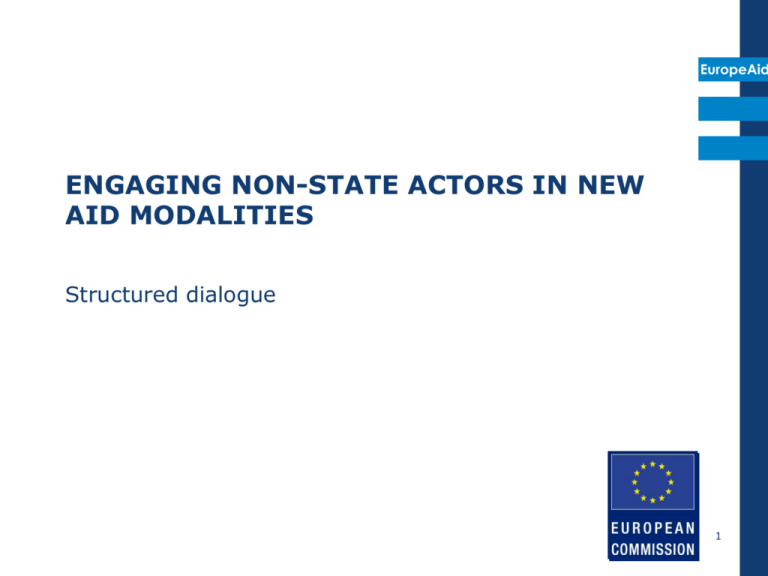
EuropeAid ENGAGING NON-STATE ACTORS IN NEW AID MODALITIES Structured dialogue 1 CONTENT EuropeAid 1. Why a new reference document on NSAs and NAMs? 1. What are findings and what guidance does it provide? 1. How to take this process further? 2 1. WHY THIS DOCUMENT ABOUT NSAs and NAMs? EuropeAid The answer consists of four parts: A. The evolving agenda of participatory development B. The efforts to make aid more effective through new aid modalities C. The stronger emphasis on knowledge about state-society relations and politics in development. D. Bringing various groups of EC practitioners together 3 A. Participatory development and Non-State Actors Development assistance includes support to and through NSAs Development is a multistakeholder process where the central state is one of the actors EuropeAid Development is a multi-actor participatory process Participatory development NSAs are not only implementing agencies but also promoters of democracy, justice and human rights EC/EU is committed to strengthening NSAs to fully participate in political, economic and social dialogue processes Civil Society is recognised in all its diversity B. More effective aid and New Aid Modalities EuropeAid • EC and other donors look for ways to make their aid more effective • These efforts include among other things ways to: o Align behind country policies (if these reduce poverty) o Align behind country systems (if there are serious efforts to make these systems work for the poor) o Reduce the burden on partners (through harmonisation) o And move from government ownership to country ownership, o And from mutual to domestic accountability 5 EuropeAid • What are these new aid modalities o Budget support o And the so-called sector wide approaches – or the EC’s Sector Policy Support Programmes – aren’t either • What is new about these modalities? o It’s not just about the money o Nor about one input, instrument or tool o It’s about and aid package, o An aid package that applies the principles to make aid more effective 6 budget support as an “aid package” includes: EuropeAid Alignment with partner country policies Alignment with partner country systems Policy dialogue Budget support SPSP Harmonisation among donors Results orientation Capacity development inputs C. Importance of state-society relations, and politics • Growing realisation that politics can help explain where aid has been effective and where not • It matters to know: o If and how state-society bargaining takes place o Whether, how and around which interests citizens organise collectively o How elites come to political settlements, for example over taxes, but also over the distribution of resources such as aid o Whether poverty reduction strategies and sector policies have sufficient backing within government, or within groups in society, o Etc.. • This knowledge is very country or context specific EuropeAid 8 This Reference Document connects these three processes or agendas: EuropeAid Effective aid through NAMs Participatory development through NSAs Improved knowledge of State-society relations 9 D. It also connects three groups of EC practitioners EuropeAid Macro economists Experts working with NSAs Thematic and sector experts 10 The reference document takes stock of the following experiences and processes: • In-house consultation on NSAs and NAMs • Stock-taking of experiences in EC Delegations and development of country cases • Ongoing EC consultations on budget support (Green Paper process) • EC redesign of budget support guidelines • NSA related work in the Structured Dialogue, evaluations, studies and audits • Ongoing work on improving the context analysis as part of the re-design of the Project and Programme Cycle Management • Ongoing work of applying the Governance Analysis Framework in sector operations often involving macro economists and sector specialists • NSA related initiatives related to Domestic Accountability EuropeAid 11 2. SO HOW TO TAKE THESE AGENDAS FURTHER? EuropeAid Four types of guidance From this work emerges one core message and three types of guidance: • One core message: pay more attention to relations between state and non-state actors, and balance the support accordingly • Four fundamentals and operational principles • Step by step operational guidance • Smart guidance to take the ambitious agendas further 12 EuropeAid 1 Recognize the diversity of NSAs: Move beyond the usual civil society ‘suspects’ 2 Assess and analyze NSA interests, values, histories, incentives, roles, functions, governance structures: Often a more fine-grained analysis is required of the diverse roles and structures of NSAs, the capacity for collective action, the incentives that drive them, their values and organic growth. 3 Ensure the independence of NSAs: A meaningful contribution of NSAs is only possible if they can act as actors in their own right. Fundamen tal 1: treat nonstate actors as actors EuropeAid 2 Introduce systematically political economy and governance analysis: Move away from a perspective of “what should be done”, to what “could be done”. 3 Incentivize continued learning: Favour incremental change rather than modular, overambitious leapfrogs to grand scale reforms Fundament al 2: analyse statesociety relations systematic ally EuropeAid 1 Combine the full range of modalities and instruments in a strategic way: The EC has a responsibility for the combined impact of all its development efforts. 2 Balance support for state and non-state actors in a purposeful way: The EC shares the responsibility with other donors over the longer-term impact on state-society relations beyond project and programme cycles. Fundamen tal 3 the full potential of NSAs EuropeAid 1 Avoid a technocratic approach to aid effectiveness and the role of NSAs: Accept the need for a political approach 3 Prepare for playing new roles: NAMs touch on the nature of the state and its relations with society and NSAs. Inevitably, this touches also on domestic power relations and politics. So the EC must prepare to be an informed political player. Fundamten tal 4 Do no harm play new roles Operational guidance EuropeAid Multiple questions remain about how to strategically engage with NSAs. Questions about: • The key features of the new aid modalities and the potential roles that NSAs can play • How to identify opportunities for strategic engagement with NSAs in a particular context • The entry points in the Cycle of Operations for engaging strategically with NSAs • And how to combine EC tools, instruments and approaches Further step by step guidance deals with these operational matters. 17 Smart guidance EuropeAid This is a tall agenda. One that takes time, and one that will be demanding to implement. Therefore, further guidance is about developing smart partnerships to tackle these interlinking agendas: • Joint analysis and knowledge development with other donors • Smart funding arrangements to underpin a strategic approach • Ensure cooperation and linkages between non-state actors and other domestic accountability actors • Smart partnerships with local governments 18 3. HOW TO TAKE THIS PROCESS FURTHER? A “living document” EuropeAid • This Reference Document is not a final product • The guidance it contains will be shared through the Consultative Dialogue Process • Other ongoing processes to tap into are the EC efforts to improve the coordination and pertinence of budget support, as well as the ongoing work on mutual and domestic accountability • Through the Capacity4Dev Platform, it will promote further discussion, dialogue and blogging on experiences from the field • This may contribute to improving the strategic and operational guidance on how to improve the EC’s engagement with state and society for development. 19 Thank you for the attention In case of questions, shoot… so to speak EuropeAid 20
